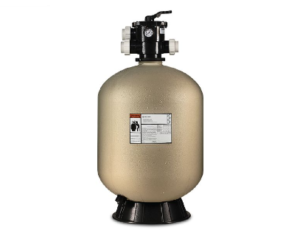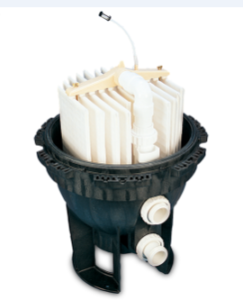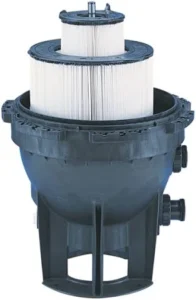Pool filters are essential for keeping your pool water clean, clear, and healthy. There are three main types of pool filters: sand filters, diatomaceous earth (DE) filters, and cartridge filters. So, how do you know which is the best for your pool? Here are the differences between them:
Sand Filters
A sand filter works by using a large tank filled with sand as the filter media. As water flows through the sand, dirt, debris, and other particles are trapped in the sand bed. Over time, the sand can become clogged with debris and needs to be backwashed, which means reversing the flow of water through the filter to flush out the accumulated debris.

Pros:
- Sand filters are low maintenance compared to other types of pool filters.
- They are generally less expensive than DE or cartridge filters.
- Sand filters can filter out particles as small as 20-40 microns.
- Filtration quality can be increased greatly by using sand alternatives, such as zeosand and glass filter media
Cons:
- Sand filters are not as effective as DE or cartridge filters in removing smaller particles and impurities.
- Backwashing can use a lot of water and may require more frequent topping up of the pool water level.
DE Filters
DE Filters: Diatomaceous earth (DE) filters use a powder made from the fossilized remains of diatoms to filter out impurities from the pool water. The powder is coated onto a series of grids inside the filter, and as water passes through, the DE powder traps the dirt and debris.

Pros:
- DE filters are the most efficient type of pool filter, capable of filtering out particles as small as 5 microns.
- They also support the use of biodegradable DE alternatives that are safer for storage and backwashing.
- DE filters can greatly improve water clarity over other types of filters and may reduce chemical usage due to being able to filter out smaller particulate matter.
Cons:
- DE filters require more frequent maintenance than sand filters, and the DE powder needs to be replaced with every cleaning/backwash.
- DE filters are generally more expensive than sand or cartridge filters.
Cartridge Filters
Cartridge filters use a replaceable cartridge made of paper or polyester to filter out impurities from the pool water. Water flows through the cartridge, which traps dirt and debris in the fibers.

Pros:
- Cartridge filters are easy to maintain and do not require backwashing.
- They are effective at filtering out particles as small as 10-20 microns.
- Cartridge filters are generally more affordable than DE filters.
Cons:
- Cartridge filters require more frequent cleaning than sand filters or DE filters, as the cartridges can become clogged with debris.
- The cartridges need to be replaced periodically, which can add to the ongoing maintenance cost.
In summary, the main differences between pool sand filters, DE filters, and cartridge filters are their effectiveness in filtering out impurities of different sizes, their maintenance requirements, and their cost. Ultimately, the best type of pool filter for your pool depends on a variety of factors, including the size of your pool, the level of usage, and your budget.



